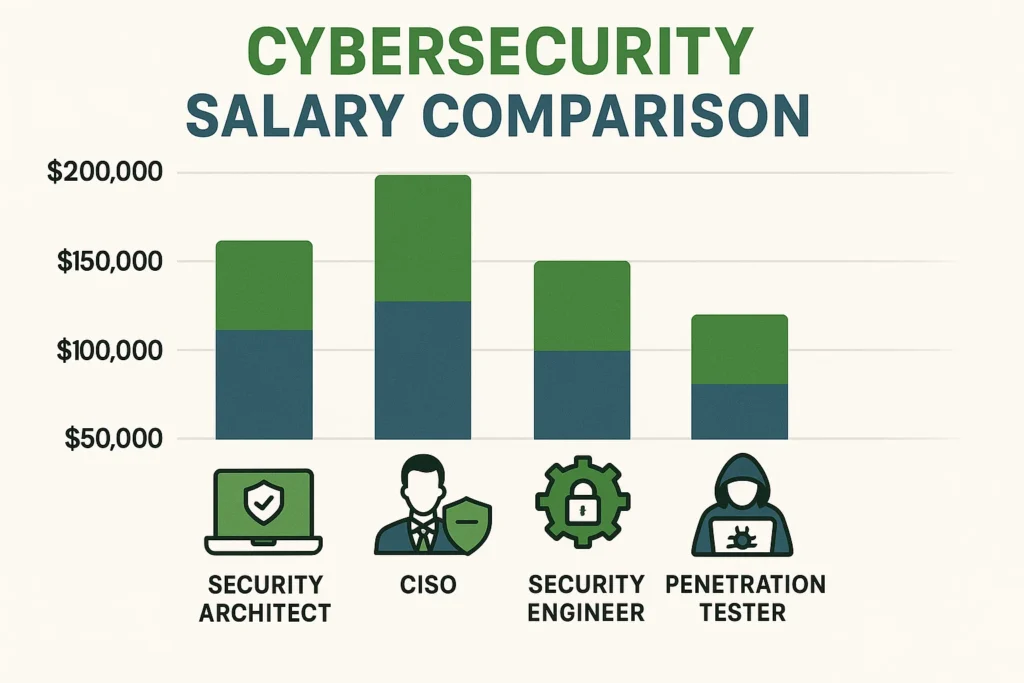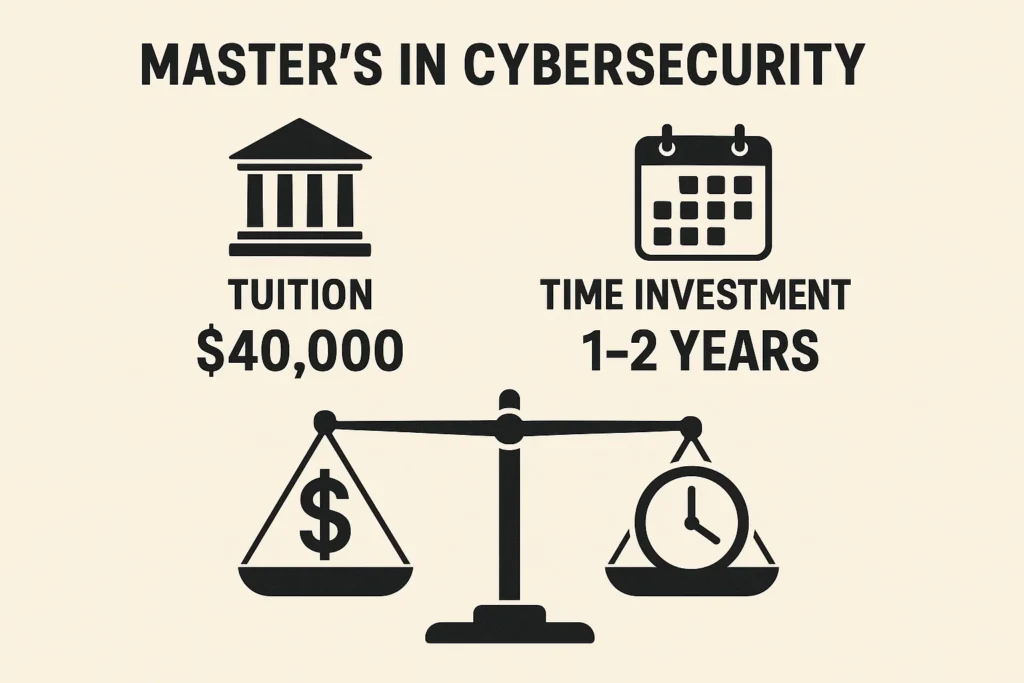Is a Master’s in Cybersecurity Worth It? Expert Insights

In today’s digital age, cybersecurity is more critical than ever. With an increasing number of cyberattacks targeting businesses and individuals, the need for skilled cybersecurity professionals has skyrocketed. If you’re considering advancing your career in this field, one of the biggest questions you might be asking yourself is, “Is a Master’s in Cybersecurity worth it?” This article will dive into the various aspects of pursuing a Master’s degree in Cybersecurity and help you make an informed decision. We’ll explore career benefits, earning potential, industry demand, and much more. So, let’s get started!
Why Cybersecurity is More Important Than Ever
Before we explore whether a Master’s degree is worth it, it’s essential to understand why cybersecurity has become such a high-demand field.
Rising Threats in the Digital World
Every day, millions of cyber threats loom over businesses, governments, and individuals. From ransomware to phishing attacks, hackers are becoming more sophisticated in exploiting vulnerabilities. According to a Cybersecurity Ventures report, global cybercrime damages are expected to reach $10.5 trillion annually by 2025, an increase from $3 trillion in 2015. This staggering rise in cybercrime is a driving force behind the need for more cybersecurity professionals.

The Demand for Cybersecurity Experts
The U.S. Bureau of Labor Statistics (BLS) projects that the cybersecurity field will grow by 35% between 2021 and 2031, which is significantly faster than the average growth rate for other occupations. This rapid growth translates to an increasing need for professionals with advanced cybersecurity skills.
What Does a Master’s in Cybersecurity Entail?
A Master’s in Cybersecurity is designed to equip students with the skills necessary to combat advanced cyber threats, safeguard sensitive data, and manage security risks. Let’s break down what you can expect from this degree program:
Curriculum Overview
A typical Master’s program in Cybersecurity includes subjects such as:
- Network Security: Protection of networks and data from cyberattacks.
- Cryptography: Techniques to secure communication and prevent unauthorized access.
- Ethical Hacking: Learning how to think like a hacker to prevent potential breaches.
- Digital Forensics: Investigating cybercrimes and recovering lost data.
- Security Risk Management: Identifying, evaluating, and mitigating risks.
Hands-On Experience
Most Master’s programs offer hands-on labs, practical exercises, and internships, ensuring that you gain real-world experience. Many universities partner with companies to provide student internships, which help you build professional connections while still in school.
Is a Master’s in Cybersecurity Worth the Investment?
Now, let’s get to the core of the question: Is this degree truly worth it? The answer depends on various factors, including career goals, earning potential, and the job market. Let’s break it down:
1. Career Advancement and Job Opportunities
High Demand for Cybersecurity Professionals
With cyber threats on the rise, employers are looking for professionals with advanced training and education. According to Robert Half’s 2022 Salary Guide, a significant skills gap exists in the cybersecurity field, with companies struggling to fill positions.
Some high-demand roles for Master’s degree holders include:
- Chief Information Security Officer (CISO)
- Security Architect
- Cybersecurity Consultant
- Incident Responder
- Penetration Tester
2. Potential Earnings After Graduation
One of the most compelling reasons to pursue a Master’s in Cybersecurity is the potential for high earnings. According to PayScale, the average annual salary for someone with a Master’s degree in Cybersecurity is approximately $106,000. This is significantly higher than the average yearly salary for entry-level cybersecurity professionals, which typically starts at around $60,000 per year.
For example, a Security Architect with a Master’s degree can earn upwards of $130,000 annually, while a CISO can make anywhere between $150,000 and $250,000 depending on the company and location.

3. Career Security and Job Stability
The cybersecurity field is expected to continue growing, and this growth directly translates to job security. According to the U.S. Department of Labor, cybersecurity roles are expected to remain among the top 10 most in-demand jobs in the years to come.
4. Broader Skillset
A Master’s degree provides you with a deeper, more comprehensive understanding of cybersecurity concepts. Unlike a short-term certification program, which might cover only one aspect of cybersecurity, a Master’s degree teaches you to approach the entire landscape of cybersecurity, including strategic thinking, risk management, and leadership in IT security. This broad skillset not only makes you valuable as an individual contributor but also prepares you for management roles.
Expert Views: What Do Professionals Say?
To get a clearer picture, let’s take a look at what some cybersecurity professionals have to say about pursuing a Master’s in Cybersecurity.
Dr. Susan Warren, Cybersecurity Consultant
Dr. Warren, who has over 20 years of experience in the field, emphasizes the importance of advanced education:
“A Master’s in Cybersecurity gives you the tools to stay ahead of evolving threats. Theoretical knowledge coupled with hands-on experience in a structured environment helps you become a leader in the field.”
John Doe, CISO at a Fortune 500 Company
John, who holds a Master’s in Cybersecurity, believes that the degree played a pivotal role in his career advancement:
“While certifications are important, a Master’s degree opened doors that I didn’t even know existed. It gave me a comprehensive understanding of the security landscape and positioned me to take on leadership roles.”
Real-Life Case Study: The Career of an Alum
Let’s take a look at the journey of Sarah Johnson, a cybersecurity professional who completed her Master’s in Cybersecurity from XYZ University.
Pre-Master’s Career
Before Sarah completed her Master’s degree, she worked as a network security analyst at a mid-sized company. While she was skilled in technical areas, she often felt restricted in terms of career growth. Her role was mainly reactive—responding to incidents and maintaining systems.
Post-Master’s Career
After completing her Master’s degree, Sarah transitioned into a Security Architect role, where she designs and implements advanced security infrastructures for large-scale businesses. Within two years, her salary increased by 40%, and she was able to lead her team of cybersecurity professionals.
Sarah attributes her career growth to the comprehensive training and strategic knowledge she gained during her Master’s program.
The Costs and Time Investment
One of the primary concerns for anyone considering higher education is the cost. The cost of a Master’s degree in Cybersecurity varies depending on the institution and program type.
Tuition Fees
- Public Universities: Tuition can range from $20,000 to $40,000 for a two-year program.
- Private Universities: Costs can rise to $50,000 or more.
However, many employers offer tuition reimbursement, and the high salary prospects often make the investment worthwhile.
Time Commitment
A typical Master’s degree in Cybersecurity takes about 2 years to complete if studying full-time. Part-time options are available, which can extend the duration but allow for more flexibility.

Pros and Cons of a Master’s in Cybersecurity
Let’s weigh the pros and cons to help you decide if this is the right path for you.
Pros:
- High Earning Potential
- Increased Job Security
- Career Advancement
- Hands-on, Real-World Experience
- Broad Skillset
Cons:
- High Tuition Costs
- Time Investment
- Possible Work-Life Balance Challenges (for full-time students)
Conclusion: Is a Master’s in Cybersecurity Worth It?
Ultimately, the decision comes down to your individual career goals, financial situation, and the time you’re willing to invest in your education. However, if you are passionate about cybersecurity and want to position yourself for leadership roles in a rapidly growing field, a Master’s in Cybersecurity is likely worth the investment.
With high job demand, excellent earning potential, and the opportunity for career advancement, this degree offers both immediate and long-term benefits. If you’re ready to take the next step and make a real impact in the fight against cybercrime, a Master’s in Cybersecurity could be the right move for you.

Similar Posts
Unlocking Your Android Screen Without a Factory Reset
Hyperscale Datacenters: Architecture, Benefits, and Future Trends
AI in Australian FinTech, Banking & Payments in 2025 | Details